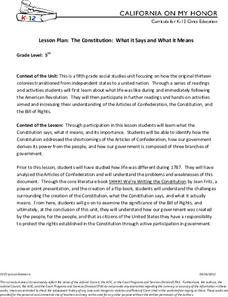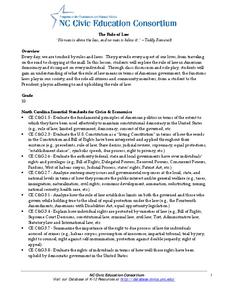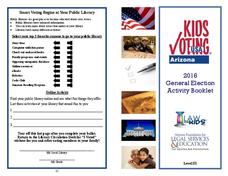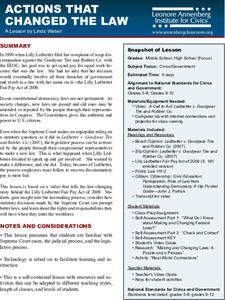C-SPAN
Choice Board: Expressed and Implied Powers
Article 1, Section 8 of the United States Constitution expressly lists powers given to Congress. Over the years, lawmakers have expanded the enumerated powers to include powers implied by the list. To better understand the significance...
Curated OER
American History Through the Len of the Supreme Court Decisions
Students examine the historical background of Supreme Court decisions and the basic principles behind legislation. As part of the lesson, students discover legal concepts and terms and write sentences using the vocabulary they have...
Administrative Office of the US Courts
US v. Alvarez
Is it illegal to lie about military service? Discuss the ways the First Amendment affects the Stolen Valor Act with a lesson that focuses on the Supreme Court case U.S. v. Alvarez. As high schoolers learn more about the history of the...
Curated OER
From Classroom to Courtroom: The Children of Supreme Court Justices
Students choose one of the Supreme Court justices and research their life as a child from birth to age 21. They identify a list of topics that related specifically to youth that this judge may have a vested interest in.
Judicial Learning Center
About Federal Judges: Qualifications of Judges
"Help Wanted: A Supreme Court Justice." What should be included in the ad? Learners ponder the question during a lively activity that asks them to examine the qualifications for various federal offices and then create job postings....
Judicial Branch of California
The Constitution: What It Says and What It Means
Learners get the chance to act as representatives to the Constitution Convention, and must decide whether or not to recommend your state ratify the new framework. After examining the Constitution line-by-line, they consider their...
C-SPAN
14th Amendment Equal Protection Clause
Two Supreme Court cases, Plessy v. Ferguson and Brown v. Board of Education take center stage in a lesson about the Equal Protection Clause of the 14th Amendment. Class members research both cases to compare and contrast the rulings.
City University of New York
Analysis Worksheet: The Supreme Court Declares that the Constitution Does Not Protect Women's Right to Vote
In this voting rights instructional activity, students read instructor-assigned pages about the Supreme Court decision that women did not have the right to vote and then respond to 3 short answer questions.
Carolina K-12
The Rule of Law
What functions do laws serve in our society? Your learners will be guided through several interactive activities to address this question, and to consider the impact of rule of law in American society.
Law for Kids
General Election Activity Booklet
It's never too early to practice smart voting! Gain practice voting in a general election using a booklet compiled of an assortment of activities including a word search, maze, graphing, and more!
Judicial Learning Center
Do You Know Your Bill of Rights?
The Bill of Rights is much more than an important piece of paper! The rights cover everything from freedom of speech to the right to remain silent if arrested. Scholars find out their own rights by answering the questions in the form of...
Annenberg Foundation
Actions that Changed the Law
The Fair Play Act of 2009 came about due to the actions of one woman. Young historians research Lilly Ledbetter and what she went through to get pay equal to that paid to men for the same work at Goodyear Tire and Rubber Company. The...
Curated OER
The "Big Four"
Students identify the four individuals who are identified as the "Big Four", examine the years they were on the bench together, and look and the impact they made in key cases.
Curated OER
What is a Court?
Students examine and discuss the judicial branch of the U.S. government. They define what a court is, list three characteristics of a trial court and an appellate court, and analyze various trial and appeal situations.
Curated OER
Civil Rights and the Michigan Supreme Court II
Students view a PowerPoint presentation on the Michigan Supreme Court Historical Society's Civil Rights and/or the Native American Rights. They write a reaction paper and prepare for a class discussion. They work in groups and discuss...
Curated OER
Branches of Government Graphic
Students explore the three branches of government. They create a graphic diagram to show each branch of government. Students include the qualifications for service and duties of each branch of government in their graphic diagram.
Curated OER
Supreme Court Decisions and Their Effect On Us
Consider five Supreme Court cases and how their outcomes have directly affected the American population. Government students research and compose a 1-2 page pager outlining the examples of our daily life that have specifically been...
Curated OER
Supreme Court Decisions on Freedom of Religion
What does freedom of religion mean? Analyze a series of Supreme Court cases where the First Amendment right to freedom of religion was put to the test. They discuss the cases' outcomes and argue whether the right decision was made....
Curated OER
From Tinker to Fraser: Freedom of Speech in Public Schools
The Tinker and Fraser cases were taken the Supreme Court on the basis of the 1st Amendment right to Freedom of Speech. Learners discuss each case, the First AMendment, complete handouts, and conduct a role play activity. Handouts are...
Curated OER
Mueller v. Allen
Students investigate a First Amendment legal case involving religion, education, and reimbursement of tuition payments. They research the background of the cases and its precedents.
Curated OER
Civil Liberties and War Powers: Korematsu v. United States
Eleventh graders compare and contrast Supreme Court decisions dealing with the application of civil rights during times of war, with emphasis on discrimination and detention. Working in groups, 11th graders review cases and analyze how...
Curated OER
Supreme Court Case Study: District of Columbia Vs Heller
Examine the Supreme Court case, District of Columbia vs Heller, to build a better understanding of the Bill of Rights. Learners visit three different websites, read the provided informational text, and then answer a series of critical...
Curated OER
Stories of Freedom and Justice: Learning Resources
Students are introduce to the topic of nonviolence and civil rights by watching a video. For this stories of freedom lesson, students examine the Supreme Court's role in interpreting the U.S. Constitution. Students analyze how conflict...
Curated OER
Making the Supreme Court Matter to Teens
Here are lessons and ideas to help social studies teachers enlighten students about the importance of the Supreme Court.

























